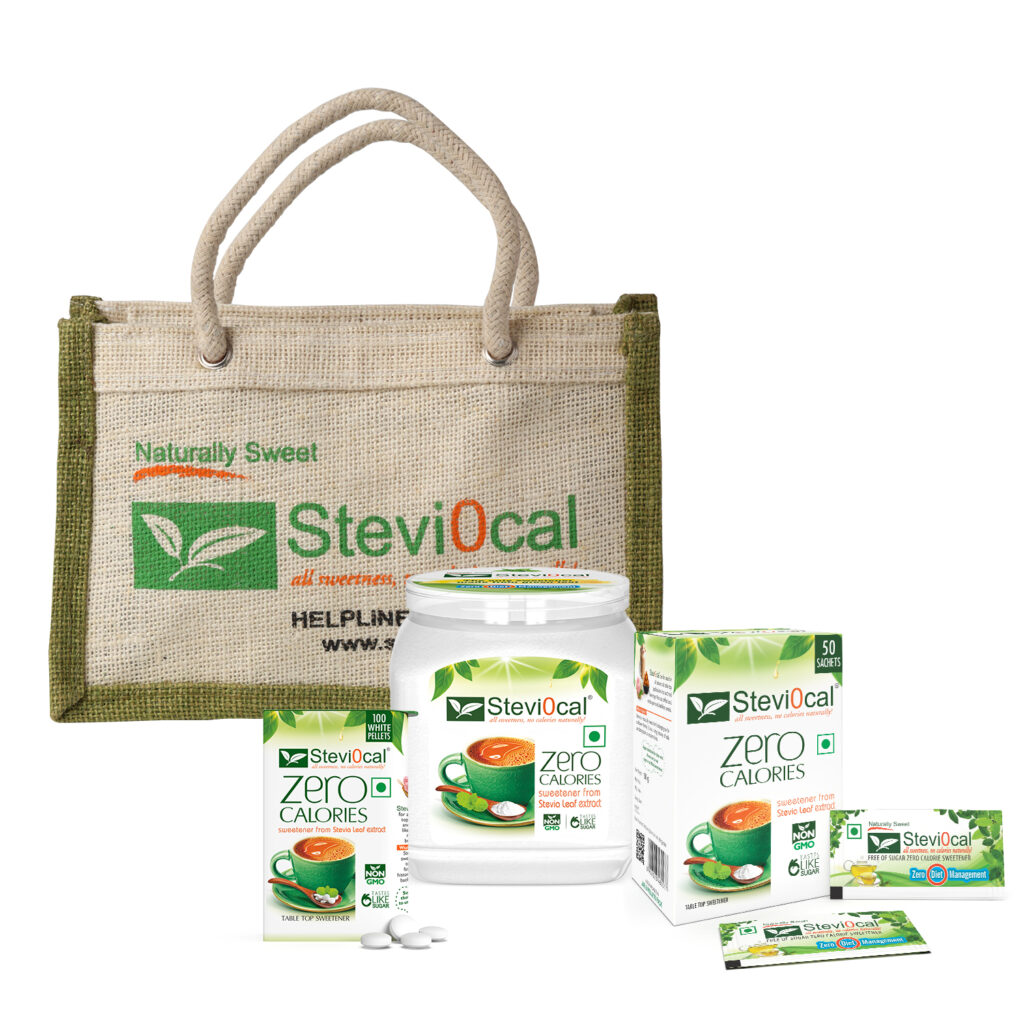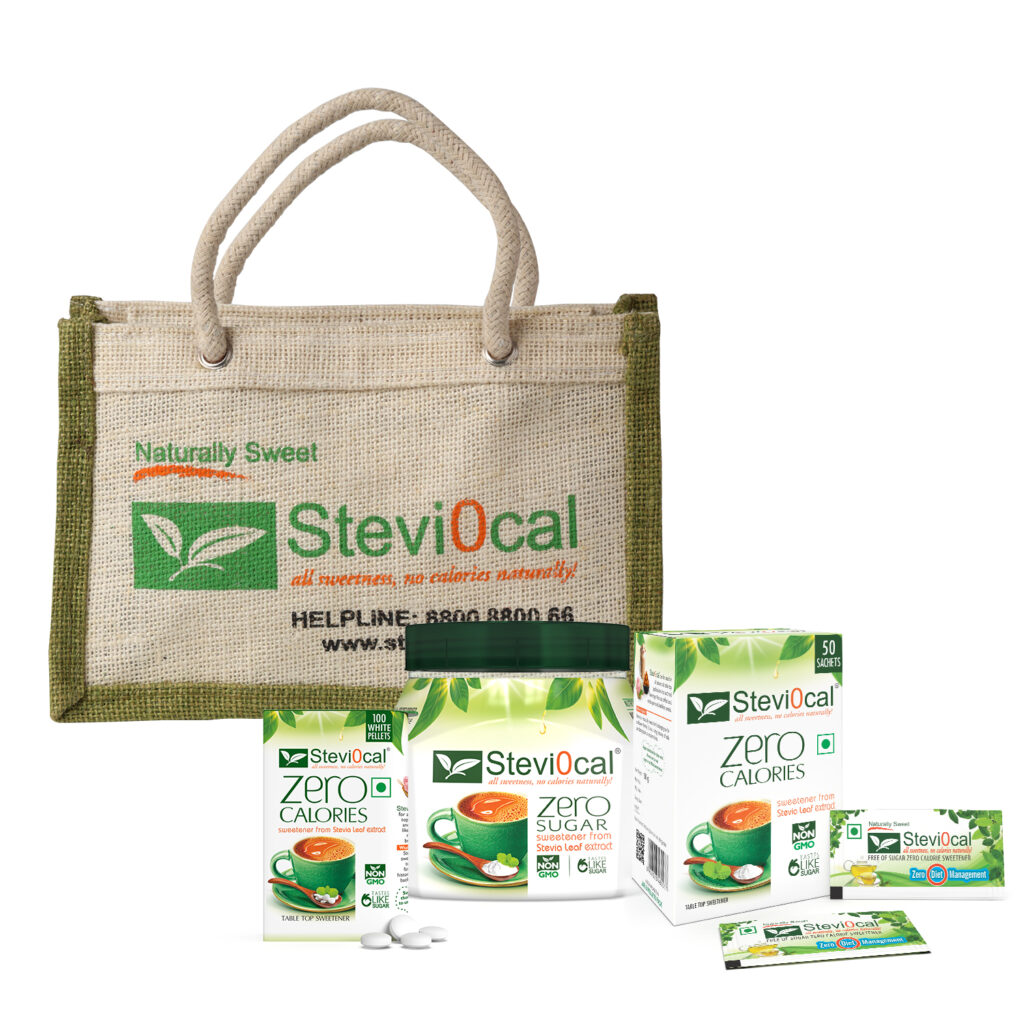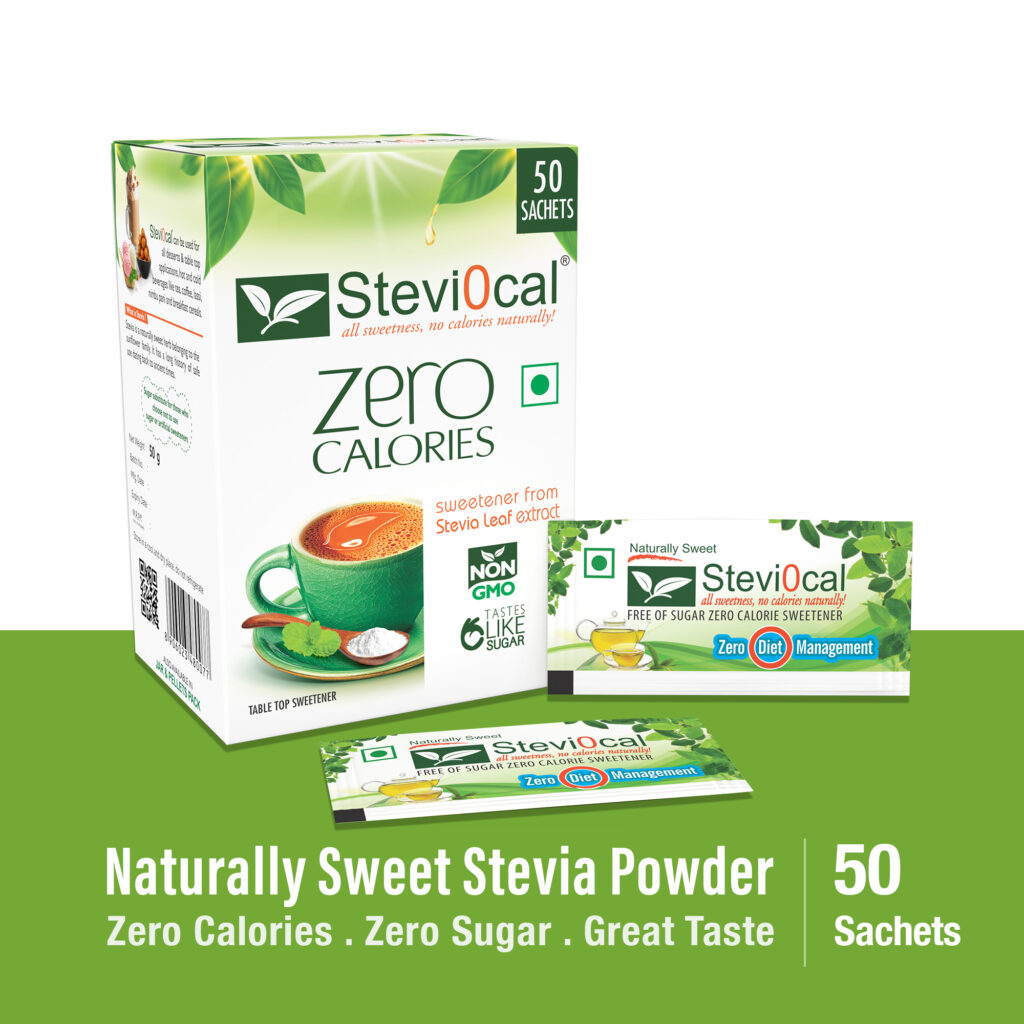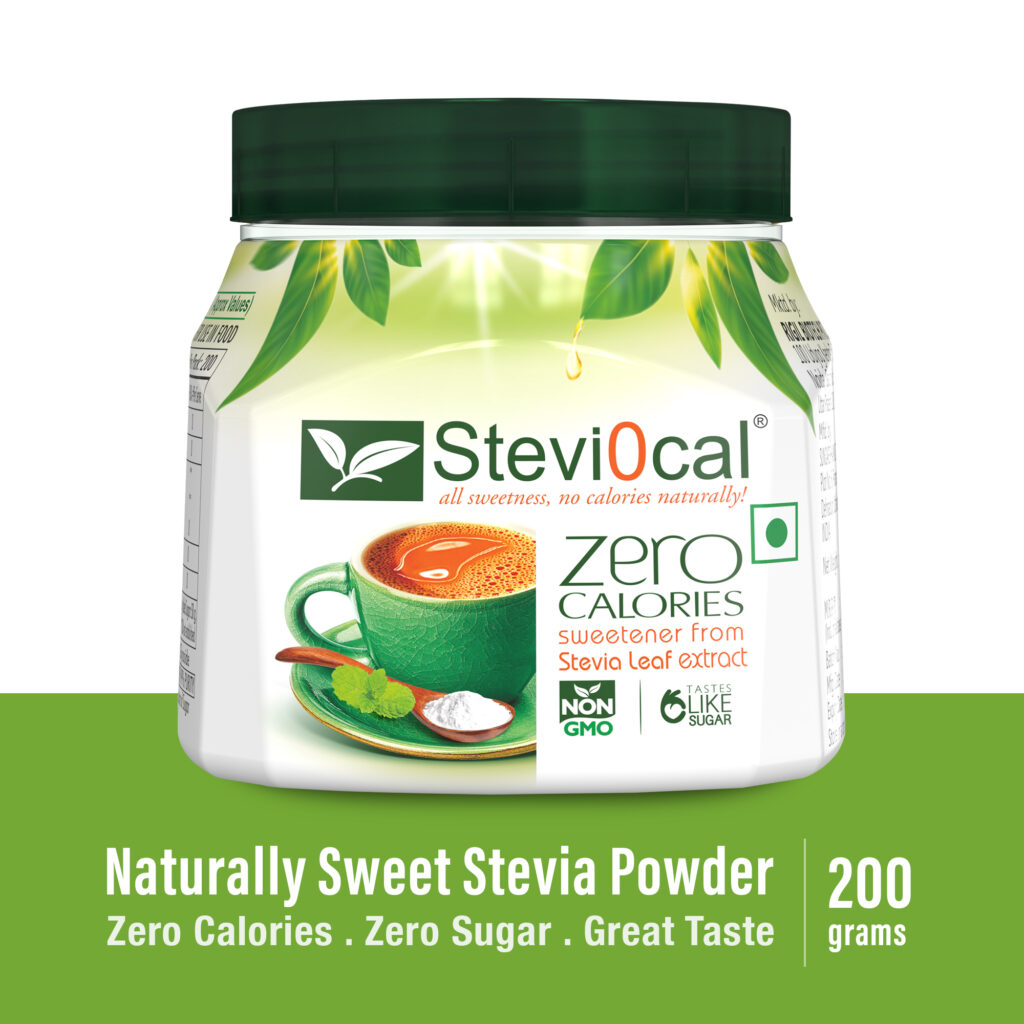Stevi0cal FAQ: Health Information & Safety
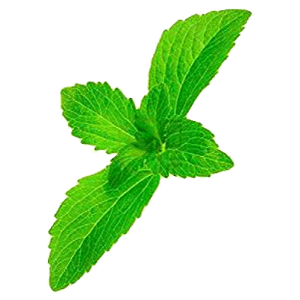
Frequently Asked Questions!
Have a question about Stevi0cal sweetener products? We have answers. If you can't find what you're looking for, please contact us.
Stevia Rebaudiana is a herb in the Chrysanthemum family, which grows wild as a small shrub in parts of Paraguay and Brazil. The glycosides in its leaves, including up to 10% Stevioside, account for its incredible sweetness, making it unique among the nearly 300 species of Stevia plants.
There are indications that Stevia (or Ca-he-he) has been used to sweeten a native beverage called mateí since Pre-Columbian times. However, a Natural Scientist name Antonio Bertoni first recorded its usage by native tribes in 1887.
Mainly in Paraguay, Australia, Brazil, Japan, India and China. There are other growers scattered across the Pacific Rim.
First, as a prepackaged replacement for sugar and artificial sweeteners. Second, it has been used in various food products, including the Japanese sugar-free versions of Wrigley’s gums, Beatrice Foods yogurts and even Diet Coke. It has also been used in Japanese style pickles, dried sea foods, fish meat products, vegetables and sea foods boiled down with soy sauce, confectioneries, and a host of other products.
Absolutely, Stevia is an all-natural herbal product with centuries of safe usage by native Indians in Paraguay. It has been thoroughly tested in dozens of tests around the world and found to be completely non-toxic. It has also been consumed safely in massive quantities (Thousands of tonnes annually) for the past twenty years.
Yes. Refined sugar is virtually devoid of nutritional benefits and, at best, represents empty calories in the diet. At worst, it has been implicated in numerous degenerative diseases. Stevia is much sweeter than sugar and has none of sugar’s unhealthy drawbacks.
The crude Stevia leaves and herbal powder (green) are reported to be 10-15 times sweeter than table sugar. The refined extracts of Stevia called Steviosides (a white powder, 85-95% Steviosides) claim to be 200-300 times sweeter than table sugar.
Yes! It is not recommended that humans should consume anything artificial in their diets. Stevia offers a safe, all-natural, alternative to these “toxic time-bombs-Artificial Sweeteners”. Industrial usage in Japan proves that this substitution is both practical and economical.
Virtually none. The refined Stevia extract is considered to have Zero Calories, Zero Carbohydrates, Zero Sugar, Zero Fat and Zero Cholesterol.
Will Stevia raise my blood sugar levels?
Not at all. In fact, according to some recent research, it may actually reduce blood sugar levels in people with high blood sugar (hyperglycemics, diabetics).
Diabetes is a medical condition, which should be monitored and treated by a qualified physician or health care practitioner. However, Stevia can be a part of a healthy diet for anyone with blood sugar problems since it does not raise blood sugar levels.
Most certainly. However, sweeteners in general should be used in moderation in a balanced healthy diet. Refined and artificial sweeteners should be avoided altogether.
Apparently not. Two tests conducted by Purdue University’s Dental Science Research Group have concluded that Stevioside is both fluoride compatible and “significantly” inhibits the development of plaque, thus Stevia may actually help to prevent cavities.
Absolutely! Industrial research in Japan has shown that Stevia and Stevioside extracts are extremely heat stable in a variety of everyday cooking and baking situations.
Raw herbal Stevia contains nearly one hundred identified phytonutrients and volatile oils, including trace amounts of Rutin (from the Callus) and B-Sitosterol (from the leaves). However, in the quantities typically consumed, the nutritive benefits will be negligible. The extracts of Stevia, being more refined, will contain far fewer of these phytonutrients and volatile oils.
Extracts of Stevia leaves can be prepared by a number of methods, some of which are patented. One-researcher states: “Production of Stevioside involves water extraction from the dried leaves, followed by clarification and crystallization processes. Most commercial processes consist of water extraction, decoloration, and purification using ion-exchange resins, electrolytic techniques, or precipitating agents.
Since Stevia is 10 to 15 times sweeter than sugar, this is a fair, if approximate, replacement factor. Since the crude herb may vary in strength, some experimentation may be necessary. The purified Stevioside extracts are between 200-300 times sweeter than sugar and should be used very sparingly due to the intense sweet taste.
Stevia does not caramelize as sugar does. Meringues may also be difficult since Stevia does not brown or crystalize as sugar does.
The green herbal powder may impart a slight amount of color to your food, depending on how much you use in your recipe. If color is a concern then, It is suggested that you use the white powdered extract or a similar “clear” liquid extract of Stevia.
At your local natural food store. As Stevia gains consumer acceptance, it may also begin to appear in supermarkets and grocery stores, but probably only in it’s refined form.
Very bright, considering the fact that it has been referred by some leading experts as “SUGAR OF THE FUTURE”. As long as the gene stock of the Native Paraguay Stevia Rebaudiana species is preserved in the wild. Over harvesting and foreign transplantation has depleted this stock which contains the greatest possible gene diversity, essential to the strength and continuance of the species.
Best Selling Products

-
Stevi0cal Natural Sweetener Gift Pack Grande
Rated 0 out of 5₹965 -
Stevi0cal Natural Sweetener Gift Pack
Rated 0 out of 5₹749 -
Stock Out
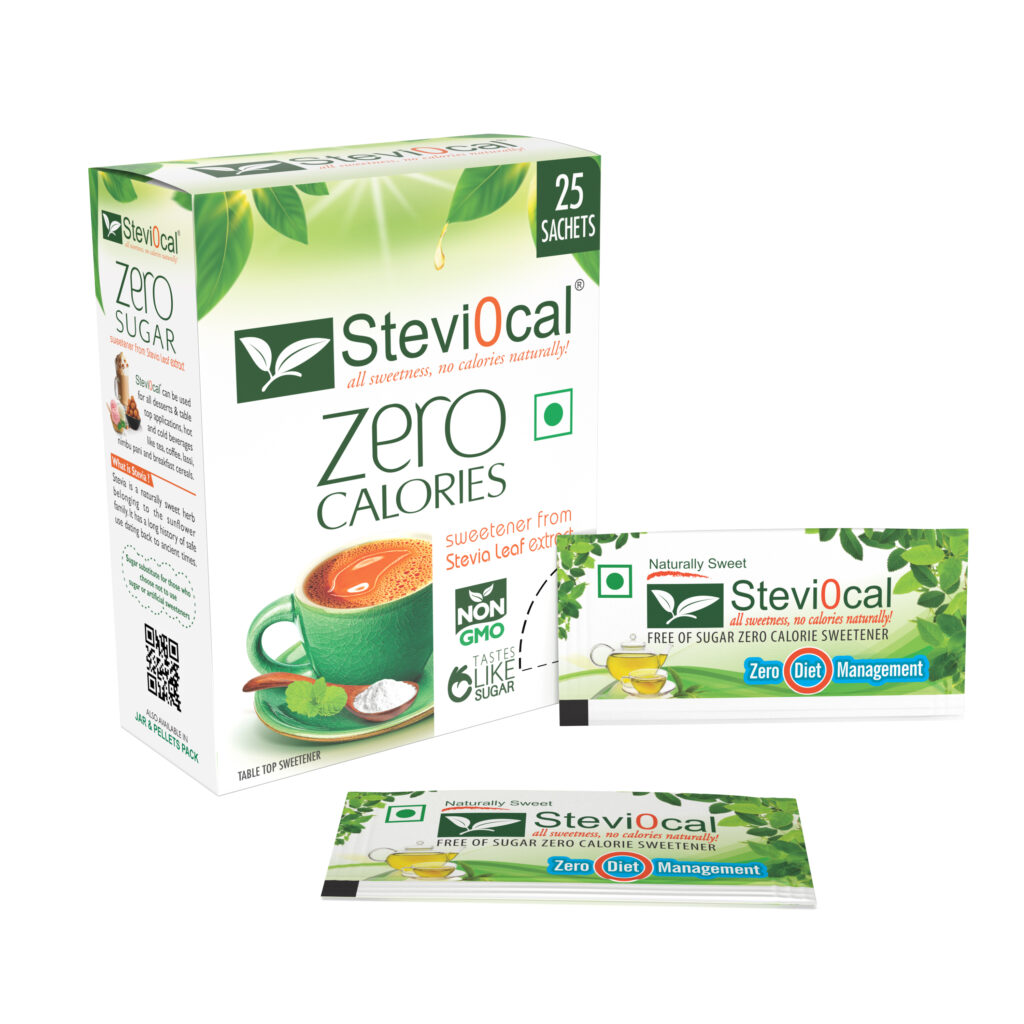
Stevi0cal Sweetener Monocarton - 25 Sachet Pack
Rated 0 out of 5₹75 -
Stevi0cal Sweetener Monocarton - 50 Sachet Pack
Rated 5.00 out of 5 based on 1 customer rating₹160 -
Stevi0cal Natural Sweetener Spoonable – 200 gm Jar
Rated 0 out of 5₹360

